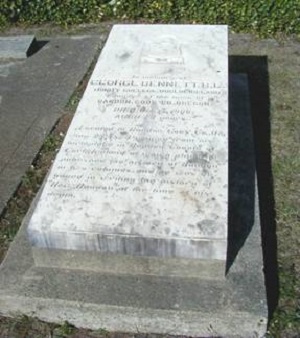

Bandon's Founder - George Bennett
by Jim Proehl
 His headstone in Bandon’s Averill Cemetery identifies George Bennett
as “The Founder of Bandon.” As with most historical “facts,” there is
truth in that epitaph, but not simple truth.
His headstone in Bandon’s Averill Cemetery identifies George Bennett
as “The Founder of Bandon.” As with most historical “facts,” there is
truth in that epitaph, but not simple truth.
Lord Bennett’s account of his first trip to the place he helped become Bandon is an interesting piece of writing that reveals some of the character of “The Founder of Bandon.”
Writing in the royal “we,” Lord Bennett tells the story of his journey to America in 1873. “We came here from Bandon in Ireland, which we left on the 26th day of May, and landed in the capital of Coos county as previously stated, including delays in New York and San Francisco, in less than a month.”
Empire City was the county seat in 1873.
Two sons accompanied Bennett to Coos County. The young men travelled down the Coquille River a couple days ahead of their father.
Still using the “we” and “our” to refer to himself, Bennett continues his account of his journey to the coast.
“Our course was up to Judge Hall’s place and from there across the isthmus to the head of Beaver Slough. There we waited several hours for a boat. It was a lonely place, surrounded by hills, which were heavily timbered to their very summit, with gigantic spruce and fir.
“There wasn’t the twitter of a bird, or even a breeze, however light or soft, to ruffle the foliage of the salmon berry, the alder, or the willow that surrounded us.
“At last the boat came and we commenced our journey down to the Coquille. It was a little flat-bottomed affair and the boatman stood in the fore part using his paddle. With this he not only paddled the boat, but pushed it from side to side as it struck against either bank, struck against a sunken log, stuck fast in a mud bank, or butted against a beaver dam.
“Meanwhile, we had to duck our head every few minutes to prevent the overhanging brush from tearing the hair off our head, or one of the branches catching us under the chin and hoisting us overboard, deposit us in a greasy, oozy slime where we could probably remain.
“As we got further down we got into deeper and broader water and we got more courage; we asked our boatman several questions, but he seldom answered us, and when he did it was in monosyllables.
“Then we thought he looked angry at us, and we couldn’t tell for what.
“He turned round and looked sharply at us three or four times, and then the courage which we had begun to feel left us, as we felt convinced that he was only waiting for a chance to strike us on the head with that horrible paddle and having taken our money—and we had considerable with us at that time—throw us over to the numerous water rats that were swimming around, to be devoured by them at leisure.
“We became bereft of hope.
“Every look he gave us told us plainly that we were drawing nearer to our untimely end.
“If it wasn’t at this turn or bend of the river, it will surely be at the next.
“We were unwell and felt cumbersome and heavy, and could scarcely make a move to defend ourselves.
“He was as light and agile as a wild cat or a panther.
“At last, when we had resolved to submit quietly to our fate, a thought flashed across our mind. ‘Masonry abounds in the United States. Try him; he may be a friend and brother. If he is, you are safe. If he is not, you cannot be worse than you are anyhow.’
“As he was turning round and, as we fancied, to finish us, we telegraphed Masonically.
“He started, and looked keenly at us.
“Hurrah, we’re safe, thought we, as we telegraphed again, and a faint smile glimmered over his beaming countenance.
“He telegraphed back and immediately he telegraphed a step further.
“Throwing down his paddle—yes that horrible paddle—and rushing toward us with his outstretched arms. ‘How are you brother?’ said he, as he warmly and eagerly shook us by both hands.
“We need scarcely say that we were only too glad to gratefully reciprocate the recognition. We were one at once.
“All our fears left us.
“We were under the protection of a brother Mason, and our mind was at rest.”
Having survived his first trip down the Coquille, Bennett bought a huge parcel of beachfront land, cleared a 400-acre farm, and platted a town he called “Bandon Beach” on the area near Coquille Point.
About the same time, the Averill and Dyer families were establishing a town on the riverfront. Bennett convinced the citizens to consolidate the two communities and choose the name Bandon, the name of his hometown, over the name Averill, the name of the town platted along the river.
So Lord Bennett’s title of “The Founder of Bandon” is a fact, if not the whole story.
Bennett wrote a 500-page history of Bandon—Bandon, Ireland. He was at work on his history of Bandon, Oregon when he died in 1900. The story of his first trip down the Coquille is taken from that uncompleted manuscript, which was discovered about 25 years after his death and published in a 1927 edition of the Oregon Historical Society quarterly.
He never mentions gorse, but he didn’t finish the book.